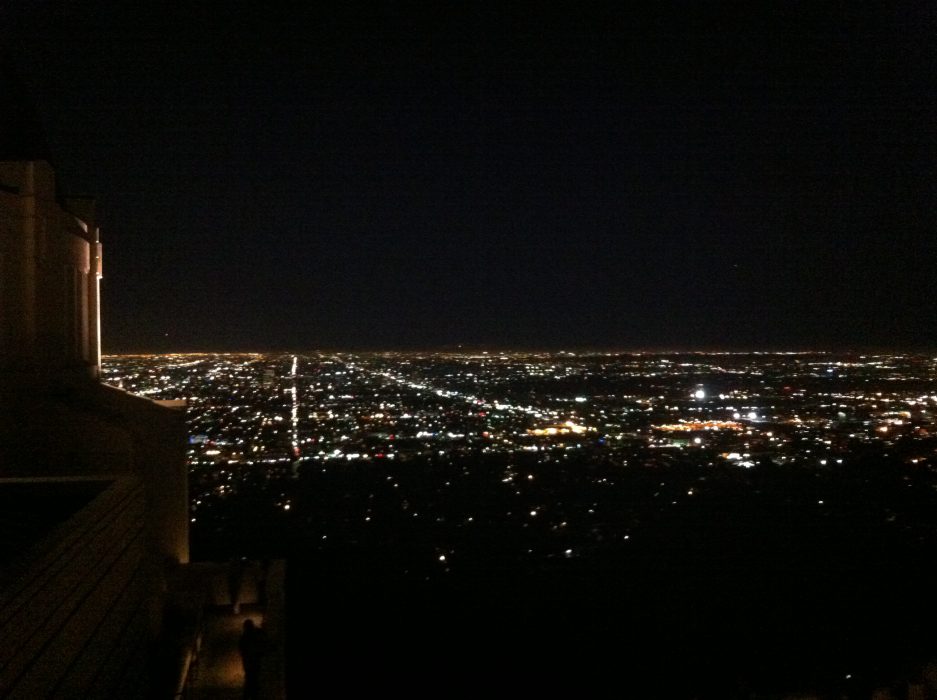Fiction
| Short Story
Paris Portraits
Grace wore broad, airy pants; I was in tight black and fake fur. Her face pinked, washed wide and open; mine clenched white against the night cold etching its way between the buildings. She stood on one curb of the Boulevard Montparnasse. I stood on the other. Her skin felt soft, stretched loose. Her […]
Grace wore broad,
airy pants; I was in tight black and fake fur. Her face pinked, washed wide and
open; mine clenched white against the night cold etching its way between the
buildings. She stood on one curb of the Boulevard Montparnasse. I stood on the
other.
Her
skin felt soft, stretched loose. Her hands clasped the backs of my shoulders,
pulling me in. She buried her head in the brown fur at my neck. I buried mine
as best I could in the thin cloth that wrinkled over her shoulders.
“Aren’t
you cold?” I asked, my lips vibrating against her skin.
“Hmm
. . . No,” she said, and I could smell the beer on her breath. They waited for
hours, she and her friend, for a train from Brussels.
Looking
into Grace’s face was like sinking into a night bed of smiles. Her skin still
radiated faraway warmth, but the red had traveled from somewhere else, some
train station café serving over-sized tumblers of beer and meager portions of
food. Her lips bubbled and her eyes glinted, glassy. I smiled back blushing,
dead sober.
Grace’s
bags were large and cheap. She had force fed them packages and cloth,
figurines, black masks, and now she attempted to lift one to her hip like a
proud mother.
“Let
me carry the other one.” I lifted it and felt the strap strain in its stitches.
I did as she had done and rested it on my hip, wrapping my arm around its body.
“How did you carry both of these at once?”
She
didn’t answer. She was busy smiling at the sidewalk. When I started to walk,
she looked up.
“You
look so sophisticated, Anne,” she laughed. “So French.” I surged with pride; it
had been so long since I had been admired. Paris was hard, unloving. I could
never draw the kind of attention I dreamed of, the kind that drained from
handsome men’s eyes and lips. My French still came crookedly, and any
encouragement from Madame Reneau trickled from a kind of frustrated disgust. I
was overjoyed to hear the words “sophisticated” and “French” and know they were
referring to me.
“You
look beautiful,” I called through the wind that threw our hair out in front,
though Grace’s was cut shorter than mine and curled at her neck. Mine had kept
on its course, straightening with every inch. Her face shone, the skin so
patiently rubbed by the sun. I had longed for that face, and now here it was
again, floating glowingly beside me.
I
guided her across the street, a broad black river of cold cement. Golden light
throbbed from the café on the corner. At the tables customers leaned back,
leaned in, cigarette smoke curled above their heads. They watched us push
across the street with our identical bundles, Grace in her wide, billowing
pants and tunic, me in my too-tight black, my fake fur.
Grace
began to shiver at the front gate. I hurried to grab my keys out of my purse
but my hands fumbled in the black gloves I’d put on before leaving the
apartment. For a moment I saw Grace against the gray buildings and puddled
pavement, the great bulk of the transparently thin bag lumping out from under
her armpit, and it felt like we would never go inside together, that one of us
would be stuck here forever. I could not in that moment remember what Grace
looked like in a sweater and jeans, her long hair winding down. Though her
shoulders noticeably shook the complacent look on her face remained as if she
did not plan to follow me in.
“Grace,
how much did you drink on your way here?” I asked as the lock clicked and I
leaned into the door. Now I stood inside the gate and she stood outside, her
voice barely lifting above the street wind, “They had these giant mugs of beer
in the Brussels train station.” She sounded like she was still there, yelling
over the rushing station noise. But then the gate closed behind her as she
stepped in after me and the echo of her voice seemed to take her breath away.
She paused there in the dark, holding it in.
“This
is where you live?” she whispered.
She
had her head tipped back to climb the stories with her eyes, the rows of tall,
black windows, some curtained, some blank.
“On
the third floor,” I said, turning to cross the courtyard. “She just has half of
one of the floors.”
“Still,”
Grace murmured behind me. Her bag rumbled in reply.
With
my free arm I proudly flung the interior door open, holding it out to Grace as
she passed through it. Madame would be asleep when I slipped my key into the
lock. I would wave Grace into the foyer, where only the edges of things
glimmered and the whole was lost in darkness. I would listen to her whisper
again, “Still.”
Once
inside I hesitated. I wanted Grace to see what I had been living with those
last six months, the silver on the dining room table, the shake of the crystal
chandelier. But the walls closed in with darkness, making the apartment seem
only one room in size, as if, unknowingly, Madame lay sleeping in one of the
dark corners before us.
I
led Grace into the long hall. A heavy clock ticked. I could hear her breathing
on the walls. We quickly passed Madame’s room and then continued into further
blackness, where the kitchen hummed cool and blue and the toilet waited in its
narrow stall. At the very end, held at a distance from Madame’s, was my room. I
knew by now how to open it blind.
Enough
yellow light leaked in from one of the courtyard lamps to make the room seem
like a giant closet. The yellow slitted through the blinds of the tall window
as if another larger room waited on the other side, with a bed, a bureau, a
family of giants.
Our
bags came down from our shoulders and I stepped over them to reach the switch
by the door. Immediately the closet vanished and we stood together in a tall,
fireplaced room, with wall-high bookshelves, a glossy wood desk, a narrow
yellow bed, and a high-backed armchair, its feet placed daintily on the edge of
the rug.
“This
is your room?”
“Hm-hm.”
Proudly.
“Look
at that lampshade.” The shade belonged to the lamp on the desk, the large
Venetian body of which I had caught one time, absent-handedly, after my coat
sleeve had passed too close by. Placing it back in its place, a little further
in from the edge, I thought I’d heard the crash and the shatter, and the quick
quick thudding of Madame Reneau coming down the hall.
“Did
you take a lot of pictures in Africa?” I wondered where she had buried her
camera.
She
knew she didn’t have to answer that and didn’t. She stood before the mirror
above the fireplace, inspecting herself. The complacent mouth had sunk away and
the eyes looked serious about something in her face. She kept turning her head from
side to side, tilted slightly. Finally she pushed her hair back with two palms
and turned toward me, letting her arms drop.
“You
look so different,” she said half smilingly. Then she said, “I look so different.” She turned back
toward the mirror running her hands through her hair as if it should have been
longer. I bent down and pushed the bags under the desk, preparing space.
“Let’s
go to sleep.”
The
bed fit the two of us, crooked side by side. I could still smell the beer on
Grace’s neck and hair and wondered, how far gone is she? Has she been drunk
these past six months? How did she handle them, the dirt-floor cafés and
leaning men, the ring of girls she’d just met around a table and the bottles
the size of arms lined up for them? She had written to me about the afternoon
drinkings, the orange sunsets reflected in the blurring eyes of new friends.
They had to be home by dark and then could not go out again until morning. They
said goodbye to each other with beery kisses, hallucinating all the way home. I
wondered, what had she seen on her way each night? Did she know she was here
now, with me? I looked up and saw that the shadow patterns on the ceiling were
just as they had been the night before, that the tap was the same from a drip
on the sill. But now Grace was in the room, her cropped hair flaring out from
under the sheet, her shoulder curling away from my chin. Slowly the breathing
came, welling up from the depths of the blanket, my ears remembering so many
nights of falling to sleep next to her sound, the silhouette of her tucked in
under my eyelid.
Sitting
in a café the next morning, Grace gulped down her glass of water and looked out
onto the sidewalk. The windows dripped with rain, blurring the white faces
rushing past under black umbrellas. So much white, she muttered, more to
herself than to me. The flat gray of the concrete and cold steel of the cars
had startled her on our way from the house. Now she just stared back, shaking
her head.
I
ordered the coffees and began to tell her about Madame Reneau, how she had
shunned me from the day I arrived at her house because my French was not
strong. We would skirt past each other in the house until dinnertime, when, out
of obligation to the program, we would sit down and eat ensemble. Madame
Reneau was an older woman, older since the death of her husband and even older
now with a twenty-year-old mouth of bad French sitting at her own table. Now
and then, a feeling would stick, some subject would accidentally bring us into
understanding, and the dinner would pass pleasantly, both of us a little less
on guard. But so often I followed her into the kitchen afterward only to watch
her shoulders collapse over the scraping of the plates, her face draining of
talk or expression. I was wearing her down, I thought. How tiring it must be to
have a changeling in your home.
Grace
looked at me sadly. Her face appeared more round with the shorter hair. One of
the girls in Cameroon had cut it in the heat, stripping away the long hair we
once had shared. Her eyes trailed over me and I knew she too had felt like a
changeling, taken away and then given back, a different shape. She shook her
head at the table. She didn’t want to talk about it.
We
walked a while after breakfast, weaving outside the steady beat of pedestrians.
Grace wore my blue jacket and scarf, but still she looked like an outsider. I
hated the reflection of myself in the store windows, clipped and dressed in
black. How had I blended in so quickly? Was it just a matter of time before
Grace adapted back to me and me to her? I stepped on giddily, smiling at Grace
so that she would smile, but underneath it all rustled a fear that we had split
for good, the recovery no longer possible. The fear stumbled ahead of us on the
sidewalk, whispered through the rain on the sharp-edged buildings and spat up
from the black gutter holes, a fear that this was lost, she and I, that we
would never make a whole again.
As
we crossed the courtyard of my building a shaft of sunlight broke through the
cracked gray sky and burned a bright hole in the stone. Grace stopped to gaze
at it and then looked at me and said, “I want to take portraits.” I nodded and
turned toward the door. “Of us,” she said to my back as we climbed single-file
up the stairs. “I want to take portraits of us.”
We
pushed the great desk back to bring it as far away from the bed as possible,
where the light was best. This one pocket of the afternoon had sent a ray of
sunlight in through my narrow window, spotlighting the slim yellow bed. Grace
pulled out the silver legs of her tripod, planting them firmly into the hairs
of the carpet. Then she began the adjusting, her back hooked over the camera,
stretching its neck, turning its large watery eye for the right focus. I sat
jobless following her movements like a child, all of these things she knew how
to do that I didn’t. The sun caught my eye and I tilted into it. The camera
shutter clicked and Grace gave a low laugh.
“First
one,” she said.
Grace
had packed a release chord and she inserted one end into the camera’s chin,
carrying the release in her palm over to the bed. She sat next to me and placed
herself in line with my shoulders as best she could. I noticed the slight bend
in her back that had worsened. She tried to straighten the curve, eyeing me.
The
shutter clicked. Sun bathed our heads and chests and the parting lids of the
small black eye opened and shut like a blink. We froze before her, our smiles
fading. The eye blinked again.
Grace
rose and moved the tripod closer to the bed, attaching a new lens. She pointed
it at my face and snapped the shutter when I smiled, then snapped it again when
my face had straightened. After inching its head to the right, she sat beside
me again and the shutter clicked, our faces pressed into the frame, one alongside
the other. I felt Grace’s skin shiver. She had wanted to document this for so
long and always the opportunity had slipped out of reach. She moved anxiously,
setting up for the next shot, and I sat and waited, her willing but watchful
participant. It seemed appropriate, now, to capture our bodies on this
particular day. After months of separation, the longest separation we had ever
faced, our limbs gravitated toward one another, sidled up and corrected
themselves in order to match. But as I stood beside her, waiting patiently for
the full-length shot, I couldn’t help but catch our reflections in the mirror,
the asymmetrical space between them, and give way to the knowledge sinking
through me. All hope of recovery was most certainly lost.
Grace
trembled on, growing more and more excited. Body parts. She had me undress to
my waist first, and then she did the same. With the release hidden behind her
right thigh, she brought the shutter down on our torsos, first the shoulders
and upper arms, zeroing in on the creases of our armpits and beside them the
breasts. The glass eye traced our necklines, winking over the varying patterns
of moles, the results of different sunpatches on different days in different
countries. The skin disagreed elsewhere. Along the middle of our bellies, where
Grace’s pouched out from thick meals of potatoes and peanut oil, mine tightened
around its naval, hardened by city concrete and city food. My thighs had kept
the slight tint of summer tanning, the line still bisecting the hip bone, where
Grace’s thighs were smooth and white, evenly blending with the rest. She had
worn her clothing ankle-length, even in the height of summer.
The
feet came next. Lined side by side along the hem of the bedspread, our feet, at
least, looked almost the same. The nails had grown on both pairs into arched
windows of bone, and the angled curve between ball and heel cut identically
deep. These would come out dark, shadowed from the sun swiftly passing over the
bed. The only evidence left of our original form.
For
the last shots, we held hands. Grace had to put the release on the floor by her
foot, which was pointed out and ready to tap the black button at the right
moment. The camera pointed down on our hands clasped and softly illuminated by
the glow of the curtain. I could do whatever I wanted with my head; only our
hands were in view. Hers felt so small as I grasped them, so fragile. Mine must
have felt the same. It had always been this way. Holding Grace’s hand was just
like holding my own, as if I carried myself with me when we walked together,
guiding myself to the next stopping point. Mom had told us once to hold hands
so that we would stay together. We were all out on a trail somewhere on one of
our summer trips, long, long ago. “Hold hands, you two,” she called after us.
“Hold hands so you stay with each other.” We squeezed and laughed and gained a
safe distance ahead. Here, in this room, our hold had grown light. Grace
concentrated on pressing the release with her foot, while I turned and caught
her cropped head crowned by the sun’s last blaze before making its way
underground. The crown singed her edges and I watched in awe as her small body
receded into a purpled silhouette. She was on her way.
I
didn’t hear Madame enter the front door, nor did I hear her call to me from
down the hall. When the wall creaked, I knew she was hanging her coat in the
closet. She hummed something and it came muffling through as the shutter
clicked and the blaze simpered away, and Grace let go of my hands in the
darkened room.
As
Grace put the camera in its case, dislocating its legs and unscrewing the lens
from its head, I pictured Madame Reneau leafing through the mail in the foyer,
her shoulders hunched, her graying hair falling over them. She had such a frail
form, tall and sharply angled. I pictured her there at the end of the long,
unlit hallway, and thought of the many days I would remain here while Grace
returned home. I would still be here at the end of the hall, wondering whether,
when I walked it for the final time, reaching my hand for the door, Grace would
be there waiting for me. Or would she already be gone? As in death, when it
finally came, ushering us out one at a time.







